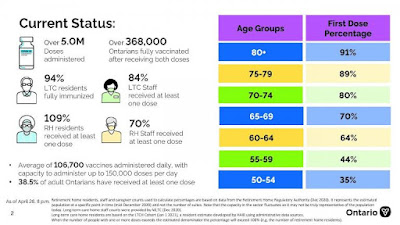We’re almost there!
Having hope but remaining diligent
We are in a conflicted place in this pandemic. On the one hand, our hospitalizations (but thankfully not our deaths) are the worst they’ve ever been, both in terms of numbers (on all three fronts - overall, ICUs, and ventilations) and length of time in hospital (the younger people who are getting Covid are more likely to survive it, but they are in hospital longer to do so), and elective surgeries have had to be postponed. On the other hand, more and more people are getting vaccinated (even if it is just the first dose), including many of our staff, and thankfully almost all our elderly (over 80% of those 70 and older) and many other vulnerable people. A potential return to some form of normalcy is potentially just weeks away. Can we start dreaming about not having to wear masks anymore?
It is especially hard living this tension with teenagers. If things are almost okay, can’t we just act like they are okay now? Why wait a few more weeks? I miss being with my friends.
What we are experiencing right now reminds me a little of what my grandparents in Holland went through in the last winter of WWII, something obviously much worse than what we are going through now. We have had our D-Day - the vaccines are here - and as the Allies moved through France and Belgium in the summer of 1944, there was great anticipation in Holland that their liberation was at hand. The Allies even made an airborne attack into central Holland in September (Operation Market Garden) to secure important bridges and accelerate the defeat of the Nazis, hopefully by Christmas. The attack was only partly successful and was followed by a German counter-attack (the Battle of the Bulge) in December and January that temporarily reclaimed parts of Belgium and Luxembourg. Holland would only see freedom many months later, on May 5, a day still celebrated every year.
The liberation of Holland happened in the spring, which is also when the tulips bloom, both in Holland and here. But in the winter 1944-45, tulips were a distant thought. It was a particularly cold winter and food was scarce. Some even resorted to eating tulip bulbs to survive and many people died of starvation. There was hope but there was also immense suffering that for some could not be overcome by the promise of better days, soon. Maybe the Germans would come up with new weapons that would again turn the war in their favour (they almost did!) just like today we are concerned about how new variants are making people more sick and could - although at this point, it seems unlikely - be resistant to vaccines.
So we continue our struggle. Almost there, but not quite. Let’s encourage each other in what we pray and hope are the final weeks of strong restrictions, to see this through as best we can. Be gentle to others and to yourself. We are Easter people and know that with God and His love shared with each other, we can come through suffering to fullness of life.
What we are experiencing right now reminds me a little of what my grandparents in Holland went through in the last winter of WWII, something obviously much worse than what we are going through now. We have had our D-Day - the vaccines are here - and as the Allies moved through France and Belgium in the summer of 1944, there was great anticipation in Holland that their liberation was at hand. The Allies even made an airborne attack into central Holland in September (Operation Market Garden) to secure important bridges and accelerate the defeat of the Nazis, hopefully by Christmas. The attack was only partly successful and was followed by a German counter-attack (the Battle of the Bulge) in December and January that temporarily reclaimed parts of Belgium and Luxembourg. Holland would only see freedom many months later, on May 5, a day still celebrated every year.
The liberation of Holland happened in the spring, which is also when the tulips bloom, both in Holland and here. But in the winter 1944-45, tulips were a distant thought. It was a particularly cold winter and food was scarce. Some even resorted to eating tulip bulbs to survive and many people died of starvation. There was hope but there was also immense suffering that for some could not be overcome by the promise of better days, soon. Maybe the Germans would come up with new weapons that would again turn the war in their favour (they almost did!) just like today we are concerned about how new variants are making people more sick and could - although at this point, it seems unlikely - be resistant to vaccines.
So we continue our struggle. Almost there, but not quite. Let’s encourage each other in what we pray and hope are the final weeks of strong restrictions, to see this through as best we can. Be gentle to others and to yourself. We are Easter people and know that with God and His love shared with each other, we can come through suffering to fullness of life.






Comments
Post a Comment